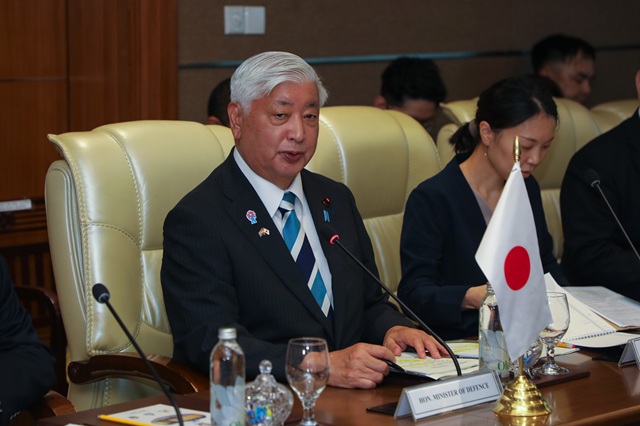On May 3, 2025, Japanese Defence Minister Nakatani Gen arrived in Sri Lanka for an official high-level visit aimed at deepening diplomatic relations and defence collaboration between the two nations. Accompanied by Japanese Ambassador Akio Isomata and Vice Minister for International Affairs Kano Koji, the minister’s visit is seen as a move to further strengthen Japan’s strategic presence in the Indian Ocean region amid increasing geopolitical tensions, particularly concerning China’s rising influence in the Indo-Pacific.
During his visit to the Defence Headquarters Complex in Sri Jayawardenepura, Kotte, on May 4, 2025, Nakatani was accorded a formal guard of honour by the Sri Lankan Army. He was received by Sri Lanka’s Defence Secretary, Air Vice Marshal Sampath Thuyacontha (Retd), and engaged in fruitful discussions focusing on reinforcing defence cooperation between Japan and Sri Lanka.
The meeting underscored several areas of collaboration, including disaster management, combating human trafficking, and addressing illegal maritime activities. Both sides emphasized the importance of a secure and stable Indian Ocean region, recognizing the growing significance of the maritime trade routes and the need for cooperative efforts in maintaining peace and prosperity.
The Japanese delegation also included senior officials, such as Special Advisor for the Ministry of Defence Lt. Gen. Bansho Koichiro (Retd) and Vice Chief of Staff of the Joint Staff Lt. Gen. Matsunaga Koji. The Sri Lankan delegation, led by Deputy Minister of Defence Maj. Gen. Jayasekara (Retd), expressed gratitude for Japan’s long-standing support in areas such as coast guard operations, disaster risk management, and maritime surveillance.
Japan’s interest in strengthening ties with Sri Lanka is not only about reinforcing bilateral relations but also about securing its influence in the larger Indo-Pacific region. Japan has been increasingly focused on countering China’s assertiveness, especially in the South China Sea, where Beijing has militarized several disputed islands. Japan, along with allies like the United States, has sought to enhance regional security frameworks to counterbalance China’s growing military and economic influence.
In recent years, Japan has positioned itself as a key player in the Indo-Pacific region, supporting initiatives aimed at ensuring free and open maritime routes. Japan’s “Free and Open Indo-Pacific” strategy has been central to its foreign and defence policies, and strengthening relationships with countries like Sri Lanka is seen as part of that broader strategy. Furthermore, Japan has been active in promoting multilateral security agreements, including collaborations with countries such as India, Australia, and the United States, to ensure regional stability.
In addition to promoting peace, Japan’s defence strategy has been undergoing a shift, particularly in terms of preparing for potential regional conflicts, notably concerning China. Japan has been expanding its military capabilities and increasing its defence budget to modernize its forces, with a focus on improving its naval and missile defence systems.
While Japan’s post-World War II constitution renounces war, the rise of China as a regional power and its territorial ambitions in the East China Sea and beyond have prompted Japan to re-evaluate its security posture. Under Prime Minister Shinzo Abe, Japan started loosening its pacifist stance, enabling its military to take a more active role in collective security efforts. Japan has also been working closely with the United States, conducting joint military exercises and expanding its defence technology collaborations.
While there has been growing speculation about Japan’s strategic plans in the event of a potential confrontation with China, the country has consistently emphasized a preference for diplomacy and multilateral approaches to conflict resolution. However, Japan’s increased military capabilities are seen as a precautionary measure to deter any aggression and ensure its national security in an increasingly uncertain environment.
Minister Nakatani Gen, who has been serving as Japan’s Defence Minister since 2019, is known for his strong stance on national security and his push for a more assertive Japanese military presence on the global stage. Prior to his tenure as Defence Minister, Nakatani served as Japan’s Minister for Education, Culture, Sports, Science, and Technology, and has a reputation for pragmatism and a deep understanding of Japan’s defence needs.
Little known to the general public, Nakatani has been a vocal advocate for Japan’s defence modernization efforts, pushing for enhanced military alliances with like-minded nations. He is particularly focused on the security of maritime routes, acknowledging Japan’s reliance on sea lanes for its energy imports and international trade.
Despite his strong support for defence reforms, Nakatani has also faced criticism domestically for his role in pushing forward security laws that allow Japan’s Self-Defence Forces to take a more proactive stance in international conflicts, a move that many view as a departure from Japan’s pacifist post-war stance.
In a gesture of respect and remembrance, Minister Nakatani and his delegation also visited the Kanatte Cemetery in Borella, where they paid floral tributes to Japanese nationals who died in Sri Lanka during the Second World War. This symbolic act was particularly poignant, given the historical context of Japan’s involvement in the region during the war.
In 1942, Japan launched an air raid on the British-controlled Colombo Harbour during World War II, which marked a significant chapter in Sri Lanka’s history. The bombing of Colombo, part of Japan’s broader strategy to disrupt Allied forces in the Indian Ocean, led to widespread damage and loss of life. This event remains a delicate aspect of the shared history between Japan and Sri Lanka, and Nakatani’s tribute is seen as an effort to acknowledge past tensions while promoting a future of peace and cooperation.


AloJapan.com